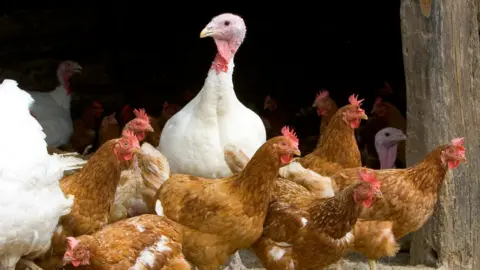Bird-flu: UK chief vet issues plea amid surge in HN51 cases
 Tim Graham/Getty Images
Tim Graham/Getty ImagesThe UK's chief veterinary officer has issued a plea urging poultry keepers to play their part in stopping the spread of bird flu.
The country faces its largest ever outbreak of the H5N1 virus - with over sixty cases confirmed since the start of November.
Lincolnshire and North Yorkshire are the worst-affected areas, with at least nine outbreaks recorded in each county.
Dr Christine Middlemiss said there was no room for complacency.
An Avian Influenza Prevention Zone (AIPZ), requiring all bird owners to keep their flocks indoors, was introduced on 3 November and extended on 29 November.
The H5N1 virus - which is highly contagious and can destroy poultry flocks - was first discovered in North Yorkshire at a premises near Thirsk on 21 November, and in Lincolnshire at a site near Alford on 11 December.
The number of outbreaks in both Alford and Thirsk has since risen to nine, with three further outbreaks reported in other parts of North Yorkshire.
'Stop mixing'
Dr Middlemiss said: "We are seeing a growing number of bird flu cases both on commercial farms and in backyard birds right across the country, with a high number of cases in Lincolnshire.
"Many poultry keepers have excellent biosecurity standards, but the number of cases we are seeing suggests that not enough is being done to keep bird flu out."
She said the main source of infection came from migratory wild birds, but the disease could also be spread on people's clothes and shoes.
"Implementing scrupulous biosecurity has never been more critical. You must regularly clean and disinfect your footwear and clothes before entering enclosures, stop your birds mixing with any wild birds and only allow visitors that are strictly necessary," she added.
Officials said the risk to human health was low, but infected birds should not be touched.

Follow BBC East Yorkshire and Lincolnshire on Facebook, Twitter, and Instagram. Send your story ideas to [email protected].
